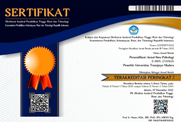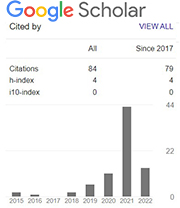Hubungan Antara Kohesivitas Keluarga dan Self Esteem pada Remaja
Abstract
ABSTRACT
This study aims to examine the relationship between family cohesiveness and self-esteem in adolescents. The population in this study were students of a private junior high school in Surabaya. The samples taken were students in two class VII and students in two class VIII totaling 110 students. This research uses correlational quantitative method. Sampling using stratified random sampling technique. The data were collected using a family cohesiveness scale and a self-esteem scale. The data analysis technique used is the product moment correlation. The results of data analysis showed a correlation value (r) of 0.411 and a significance value (p) of 0.002. This suggests that there is a relationship between family cohesiveness and self-esteem in adolescents.
ABSTRAK
Penelitian ini bertujuan untuk menguji hubungan antara kohesivitas keluarga dengan self-esteem pada remaja. Populasi pada penelitian ini adalah siswa salah satu SMP swasta di Surabaya. Sampel yang diambil adalah siswa di dua kelas VII dan siswa di dua kelas VIII berjumlah 110 siswa. Penelitian ini menggunakan metode kuantitatif korelasional. Pengambilan sampel menggunakan teknik stratified random sampling. Pengumpulan data menggunakan skala kohesivitas keluarga dan skala self-esteem. Teknik analisis data yang digunakan adalah korelasi product moment. Hasil analisis data menunjukkan nilai korelasi (r) sebesar 0,411 dan nilai signifikansi (p) sebesar 0,002. Hal ini menyatakan bahwa terdapat hubungan antara kohesivitas keluarga dengan self-esteem pada remaja.Keywords
Full Text:
PDFReferences
Al-Yagon, M., & Mikulincer, M. (2004). Socioemotional and Academic Adjustment Among Children with Learning Disorders. The Journal of Special Education, 38(2), 111–123. https://doi.org/10.1177/00224669040380020501
Baldwin, S. A., & Hoffmann, J. P. (2002). The Dynamics of Self-Esteem : A Growth-Curve Analysis. 31(2), 101–113.
Burn R.B. (1993). Konsep Diri: Teori, Pengukuran, Perkembangan dan Perilaku. Jakarta: Arcan.
Chhabra, G. S., & Sodhi, M. K. (2012). Impact of family conflict on the psychosocial behaviour in male adolescents. Journal of Nepal Paediatric Society, 32(2), 124–131. https://doi.org/10.3126/jnps.v32i2.6147
Cicognani, E. (2011). Coping Strategies With Minor Stressors in Adolescence: Relationships With Social Support, Self-Efficacy, and Psychological Well-Being. Journal of Applied Social Psychology, 41(3), 559–578. https://doi.org/10.1111/j.1559-1816.2011.00726.x
Cooper, J. E., & Braithwaite, V. A. (2016). Self-Esteem and Family Cohesion : The Child ’ s Perspective and Adjustment Author ( s ): Judith E . Cooper , Jacqueline Holman and Valerie A . Braithwaite Published by : National Council on Family Relations Stable URL : http://www.jstor.org/stable/351303. 45(1), 153–159.
Corville-Smith, J., Ryan, B. A., Adams, G. R., & Dalicandro, T. (1998). Distinguishing absentee students from regular attenders: The combined influence of personal, family, and school factors. Journal of Youth and Adolescence, 27(5), 629–640. https://doi.org/10.1023/A:1022887124634
Ekinci, O., Isik, U., Gunes, S., Yildirim, C., Killi, Y., & Guler, G. (2016). Self-concept in children and adolescents with epilepsy: The role of family functioning, mothers’ emotional symptoms and ADHD. Brain and Development, 38(8), 714–722. https://doi.org/10.1016/j.braindev.2016.02.015
Emam, M. M., & Abu-Serei, U. S. (2014). Family functioning predictors of self-concept and self-esteem in children at risk for learning disabilities in Oman: Exclusion of parent and gender contribution. International Education Studies, 7(10), 89–99. https://doi.org/10.5539/ies.v7n10p89
Feldman, R., & Masalha, S. (2010). Parent-Child and Triadic Antecedents of Children’s Social Competence: Cultural Specificity, Shared Process. Developmental Psychology, 46(2), 455–467. https://doi.org/10.1037/a0017415
Gorbett, K., & Kruczek, T. (2008). Family Factors Predicting Social Self-Esteem in Young Adults. The Family Journal, 16(1), 58–65. https://doi.org/10.1177/1066480707309603
Heiman, T., Zinck, L. C., & Heath, N. L. (2008). Parents and youth with learning disabilities: Perceptions of relationships and communication. Journal of Learning Disabilities, 41(6), 524–534. https://doi.org/10.1177/0022219408317860
Huffman, A. M. (2013). Students at Risk Due to a Lack of Family Cohesiveness: A Rising Need for Social Workers in Schools. The Clearing House: A Journal of Educational Strategies, Issues and Ideas, 86(1), 37–42. https://doi.org/10.1080/00098655.2012.731022
Kim DH, Kang IS, L. S. (2007). Social support, self-concept and self-efficacy as correlates of adolescents’ physical activity and eating habits (pp. 292–301). pp. 292–301.
Kolubinski, D. C., Marino, C., Nikčević, A. V., & Spada, M. M. (2019). A metacognitive model of self-esteem. Journal of Affective Disorders, 256(May), 42–53. https://doi.org/10.1016/j.jad.2019.05.050
Krug, S., Wittchen, H. U., Lieb, R., Beesdo-Baum, K., & Knappe, S. (2016). Family functioning mediates the association between parental depression and low self-esteem in adolescents. Journal of Affective Disorders, 203, 184–189. https://doi.org/10.1016/j.jad.2016.06.008
Levitt, M. J., Levitt, J., Bustos, G. L., Crooks, N. A., Santos, J. D., Telan, P., … Milevsky, A. (2005). Patterns of social support in the middle childhood to early adolescent transition: Implications for adjustment. Social Development, 14(3), 398–420. https://doi.org/10.1111/j.1467-9507.2005.00308.x
Liu, D., Ksinan, A. J., & Vazsonyi, A. T. (2018). Maternal support and deviance among rural adolescents: The mediating role of self-esteem. Journal of Adolescence, 69(September), 62–71. https://doi.org/10.1016/j.adolescence.2018.09.003
Lucia, V. C., & Breslau, N. (2006). Family cohesion and children’s behavior problems: A longitudinal investigation. Psychiatry Research, 141(2), 141–149. https://doi.org/10.1016/j.psychres.2005.06.009
Marsh W, H. (1990). A multidimensional, hierarchical model of self-concept: Theoretical and empirical justification. Educational Psychology Review, 2(2), 77–172.
Martín-Albo, J., Núñez, J. L., Navarro, J. G., & Grijalvo, F. (2007). The Rosenberg self-esteem scale: Translation and validation in university students. Spanish Journal of Psychology, 10(2), 458–467. https://doi.org/10.1017/S1138741600006727
Mattanah, J. F., Hancock, G. R., & Brand, B. L. (2004). Parental Attachment, Separation-Individuation, and College Student Adjustment: A Structural Equation Analysis of Mediational Effects. Journal of Counseling Psychology, 51(2), 213–225. https://doi.org/10.1037/0022-0167.51.2.213
Nasir, R., Zamani, Z. A., Khairudin, R., & Latipun. (2010). Effects of family functioning, self-esteem, and cognitive distortion on depression among Malay and Indonesian juvenile delinquents. Procedia - Social and Behavioral Sciences, 7(2), 613–620. https://doi.org/10.1016/j.sbspro.2010.10.083
Parsons, C. (2016). Evidenced-Based Care of Adolescents and Families in Crisis. Nursing Clinics of North America, 51(2), 249–260. https://doi.org/10.1016/j.cnur.2016.01.008
Peng, W., Li, D., Li, D., Jia, J., Wang, Y., & Sun, W. (2019). School disconnectedness and Adolescent Internet Addiction: Mediation by self-esteem and moderation by emotional intelligence. Computers in Human Behavior, 98(June 2018), 111–121. https://doi.org/10.1016/j.chb.2019.04.011
Roberts, R. E. L., & Bengtson, V. L. (1996). Affective Ties to Parents in Early Adulthood and Self-Esteem across 20 Years. Social Psychology Quarterly, 59(1), 96–106. https://doi.org/10.2307/2787121
Santrock, John W. (2007). Remaja. Jakarta: Erlangga.
Shigeto, A., Mangelsdorf, S. C., & Brown, G. L. (2014). Roles of family cohesiveness, marital adjustment, and child temperament in predicting child behavior with mothers and fathers. Journal of Social and Personal Relationships, 31(2), 200–220. https://doi.org/10.1177/0265407513490586
Vivona, J. M. (2000). Parental attachment styles of late adolescents: Qualities of attachment relationships and consequences for adjustment. Journal of Counseling Psychology, 47(3), 316–329. https://doi.org/10.1037//0022-0167.47.3.316
Yabiku Scott T.; Axinn William G.; Thornton Arland. (1999). Family integration and children’s self-esteem (pp. 1494–1524). pp. 1494–1524.
DOI: https://doi.org/10.21107/personifikasi.v11i2.9106
Refbacks
- There are currently no refbacks.
Copyright (c) 1970 Fendi Krisna Rusdiana

This work is licensed under a Creative Commons Attribution 4.0 International License.


Personifikasi by Universitas Trunojoyo Madura is licensed under a Creative Commons Attribution 4.0 International License.










